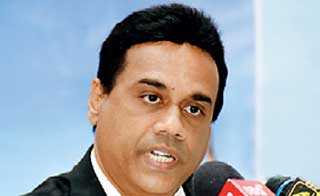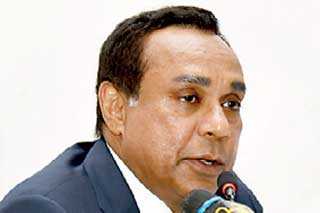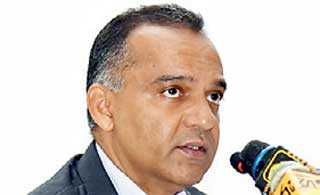Saturday Feb 14, 2026
Saturday Feb 14, 2026
Tuesday, 7 May 2019 00:52 - - {{hitsCtrl.values.hits}}
By Charumini de Silva
The country’s tourism sector, terrified by Easter Sunday extremist terror attacks - the worse setback since end of the 30-year war, is teaming up for a quicker revival provided the security situation improves fast and Government support is sincere and forthcoming.
 |
Sri Lanka Tourism Promotion Bureau and Tourism Development Authority Chairman Kishu Gomes |
 |
Tourist Hotels Association of Sri Lanka (THASL) President Sanath Ukwatte |
 |
Sri Lanka Association of Inbound Tour Operators (SLAITO) President Harith Perera |
Sri Lanka Tourism Chairman Kishu Gomes, yesterday speaking to the media first time since the 21 April mayhem, emphatically stated, “Collectively we will bounce back.”
He said that the Easter Sunday attacks was “most unfortunate” and the “biggest setback” post-war but the industry was keen to rebound and become yet again the most preferred tourist destination, an accolade which the influential Lonely Planet bestowed on Sri Lanka early this year.
After the Easter Sunday attacks on churches and three five star city hotels which killed over 250 including 44 tourists and injured over 500, he admitted that tourist arrivals have dipped by 60% - 70% but that the country still attracting 1,700 foreign visitors daily, and they were enjoying their holiday.
He commended the security forces for ensuring there had been no major incidents for the past two weeks, which confirms that the situation is being brought under control and the extremist threat is being neutralised.
Based on global experiences of similar attacks and post-recovery, Gomes estimated that Sri Lanka can bounce back within 13 months or earlier and that Sri Lanka Tourism will continue to engage in key markets and customers going forward, as a means of confidence building and promoting the destination.
“Yes, security and safety are paramount and we hope very soon we will be able to tell the world that the situation has improved considerably and tourists can come back. We also hope we can revise the 39 adverse travel advisories globally on Sri Lanka. On the part of the industry we will work together and make our best effort for a faster recovery,” Gomes told the media, flanked by heads of tourist hotels and inbound tour operators.
He said prior to the Easter Sunday incident, Sri Lanka had taken part in 37 international travel and tourism fairs and will continue to do in 25 more lined up for rest of the 2019. “We did four Sri Lanka-specific roadshows and 18 more will be continued as planned,” he added.
“In terms of reviving Sri Lanka’s brand as a safe and exciting tourist destination, we are entirely committed and confident,” emphasised Gomes, adding that the industry has harnessed lessons learnt and adopted by countries which suffered similar terror attacks in the past as well home-grown knowledge of promoting the destination in spite of a 30-year conflict in the past.
“We are keen to offer enhanced value propositions for tourists collectively and we will bounce back, which is the common and urgent goal within the industry,” he stressed.
An aggressive public relations campaign followed by stepped up advertising will be undertaken once approvals are made.
Tourist Hotels Association of Sri Lanka Chief concerned
Tourist Hotels Association of Sri Lanka (THASL) President Sanath Ukwatte said it was the first time that tourists were targeted simultaneously in three hotels in Sri Lanka during the Easter Sunday terror attacks.
“It will have a major blow on the short and medium term business affecting all stakeholders including investors, operators and employees,” he added.
Considering the direct and indirect employment, he said it amounts to around 500,000 employees which translates into two million people being affected throughout the country, considering a dependency of four family members per employee.
The hoteliers have no intention of laying off their employees given the terrible situation in the industry, but said they will not be able to maintain the same level of recruitment going forward as they are facing major cash flow issues.
With the current travel bans, evacuations and negative publicity in the international media, THASL believes it will take a long period of time for the hotel sector to recover.
“Given the magnitude of the situation, the hotel industry is in the verge of a total collapse, which may result in many people losing their employment and livelihoods,” Ukwatte said.
The hotel industry has requested assistance from the Government to help sustain itself, avoid loss of employment and see its return to normalcy.
According to Ukwatte, the key appeals to Government include; a comprehensive report on the results of the security measures taken and future measures; updates to foreign missions for them to consider relaxing travel advisories; complete waiver on interest for all borrowings for a period of one year; a moratorium on all capital repayments for a period of two years and to reschedule loans on a concessionary interest rate; a soft loan to maintain cash flow and working capital requirements; waiving off all personal loan interests and reschedule loans obtained by hotel employees for a period of two years; waiving duty on all imported security equipment and deferring the various high taxes paid by hotels on their income.
He said they held a number of meetings with the hoteliers and the Government during the past two weeks to discuss urgent recovery methods. “Last week we met with key security personnel local and foreign to discuss training of hotel security staff.
“We also requested that the Government hire a PR agency to handle the recovery plan,” he added.
The industry also wishes to implement a security procedure for all hotels, including a THASL Crisis Response Team to advise hotels on security and other long-term measures, holding frequent trainings, seek constant security upgrades and keep up-to-date with security threats and ways to respond during crisis. This is in addition to planning a strong media campaign to educate the world on the steps Sri Lanka has taken to secure itself and working closely with all stakeholders to execute a promotional campaign to revive the tourism industry.
“We are working hard to build back the global confidence in Sri Lanka and we look to the Government to help us sustain during this difficult time,” he stated.
Association of Inbound Tour Operators warns of complacency
Sri Lanka Association of Inbound Tour Operators (SLAITO) President Harith Perera stressed that if the real impact of these incidents are not managed well, it could have serious adverse effects on the industry and the country as a whole.
Noting that complacency is the biggest enemy, he said the industry has to convince their own partners and tour operators abroad to restart their sales first.
“At the moment, it’s an indefinite stop sales in Sri Lanka. Although the incident was only in a few places and 95% of the country was not affected; right now the whole territory of Sri Lanka is shown as a risk area, hence tour operators won’t support any part of Sri Lanka. From July last year, international insurance is not covering any risk on tourists travelling to countries which have negative travel advisories,” he said.
Perera pointed out that even the largest tour operator in the world has cancelled all tours to Sri Lanka including for winter.
In terms of global travellers, more than 60% of them are free independent travellers (FIT) travel where they visit risky areas on their own. Thereby he said Sri Lanka must fast track the global PR campaign to feature their reviews.
“Despite having travel advisories we still get around 1,700 to 2,000 travellers. Once we get a considerable number of FITs to Sri Lanka we should make maximum use of their reviews on social media through our global PR campaign,” he suggested.
He said a fast-tracked ‘one voice’ PR campaign is crucial at this juncture to take the message to the average John or Smith out there, flagging concerns that otherwise the perception will be created that Sri Lanka is going back to war. “Although security and public perception is something the industry cannot do in a hurry, but once the security is cleared and our machinery is activated, I am confident we will come back stronger,” Perera emphasised.